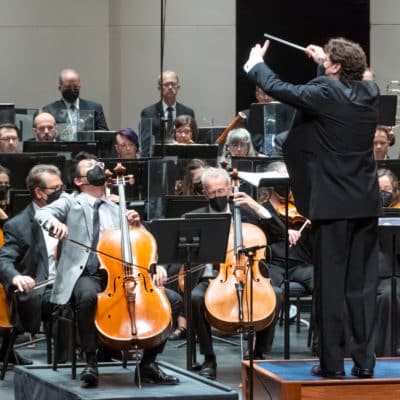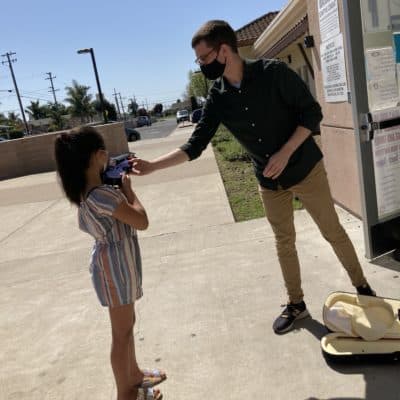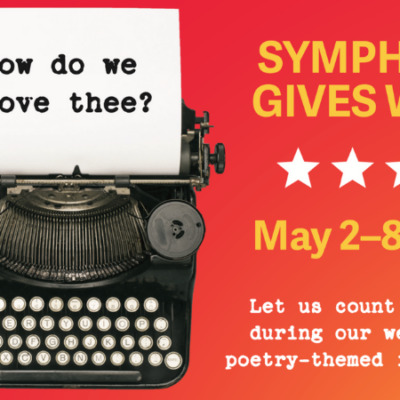The Sound Minds music education program is transforming the lives of local underprivileged students — and giving Principal Marco Gonzales a way to talk to one struggling student.

Marco Gonzales is Principal at E. M. Downer Elementary School in San Pablo, CA, where up to a third of students live below the poverty line. He lobbied hard for his school to be part of the original Sound Minds pilot program with the California Symphony in 2012 and he has championed the initiative ever since.
CSO: It’s been six years since the pilot program was launched. Are you still excited about the Sound Minds music education program?
MG: I’m still super excited about the program. The program brings a ton of energy, engagement and involvement in our school. This is my 23rd year of being a Principal and it’s still one of the most exciting things I’ve ever done in a school setting. Sound Minds has become an institution. It’s become a part of our school that is just what we do here. And it all started because of the connection between our school, E. M. Downer, and the California Symphony and the donors and supporters.
CSO: The program is founded on El Sistema principles so it’s not just a music education program, it was conceived as an instrument of social change. Living here in the Bay Area, which is generally quite affluent, why would you say we need a social change program here?
MG: I’m quoting somebody famous who said that all great societies need the Arts. The Arts for us, here in our school through Sound Minds, is an opportunity to make a connection with the bigger world, and for the kids to build a sense of identity, a sense of empowerment, and a sense of accomplishment and confidence.
When you’re a kid from an immigrant family that’s not part of mainstream America, you need something that will anchor you; you need something that you can draw upon when things get tough. That’s what I think happens with our kids here. They develop a self-confidence. And we know it shows in the classrooms as well, because they are outperforming their classmates in our local and state tests.

CSO: Two-thirds of students at your school are English language learners. How has Sound Minds affected English learners?
MG: I think our English learners here at E. M. Downer who are part of Sound Minds grow because of their exposure to another world, another language really. They learn about not only the music but where it music comes from, the history of music, and who are the composers of the pieces they learn. With the academic piece of our program, they get additional classroom time, so there’s a focused part of the day where they are working on improving academics and especially oral language.

CSO: You’ve said that student council members and “Dragon of the Month” tend to be Sound Minds students.
MG: It’s true: Sound Minds students tend to gravitate to leadership positions in our school. I think that what happens with Sound Minds students is that there’s a level of pride and accomplishment. It just gives our kids a place to belong. It gives them natural friendships where they speak the same language — they have the same excitement about their instrument or what they’ve learned — and they’re teaching one another. This is their team, this is their little in-house family and last year’s sixth graders were a great example of that. This was their school, this was their program, this was their identity. And I’m starting to see that come out now in the next wave, and that makes me really happy.
CSO: The kids from the pilot program who joined Sound Minds back in second grade graduated to middle school last year. Can you talk a little about that group?
MG: The original group of kids who joined Sound Minds were sixth graders last year. Some of them were really academic stars of our school — that was part of who they were — and some of them weren’t. Some of them who weren’t the stars academically became the leaders of the program. And there was a kid named José who was like that.
He moved out of the area, so it wasn’t easy for him to stay with the program, so it took more of a commitment. He had to ride the bus by himself sometimes so he could participate. He had his moment of not being sure if he could keep doing it because it wasn’t really easy. And he stuck with it! And at the sixth grade promotion ceremony, after the students performed, he gave us credit for helping believe in him when he didn’t believe in himself. I think there were a lot of his classmates who felt that way.
Our boys and girls now have an opportunity to take their skills to the new school and a new level because there is now a strings orchestra at the middle school that we feed into, so it doesn’t stop here. Now it really feels like this is the beginning of a long-term love or commitment for them around their music, around their violin and around their cello.
CSO: What other impact have you observed? Any anecdotes you can share?

MG: Recently a student came to my office after misbehaving in class. I mentioned I noticed her focus at the Winter Concert, and I said it seems like you’re really enjoying Sound Minds.
She looked at me like, “Are you serious? I LOVE my violin.”
And then I had a place where I could really talk to her about behavior and focus in the classroom and following the rules. It was affirmation of what we’re doing and why, and that kids are discovering these talents that they never knew they had, or their love of music through an instrument that is not part of the modern music world. When Gabriella said that to me, that was just amazing. This is why we do the program.
There are a couple of kids who have gone through the child protective system and they’re still here and they keep coming. Sound Minds becomes a place where they can be part of a bigger community and feel normal — they are doing what everyone else is doing versus maybe when they go home where it’s really not the case.
Diego has gone back and forth again between his grandmother and his mother. And where there’s one or two cases, there’s two or three more where we don’t know all the details. Even Gabriella, the young lady we spoke of who said she loved her instrument — she’s in the middle of a family custody back and forth — half the time with dad, half the time with mom. But she loves her violin and she’s here every day. Sound Minds provides students like her an anchor in many ways.
CSO: What do you see as the future for Sound Minds?
MG: The future for Sound Minds is that I hope stays here forever! And that California Symphony and our school continue to partner to make this a reality, and that future generations of students will come back and will be tutors and aids in the program, and that there will just be a cycle of kids learning and teaching as part of Sound Minds.
We’re competing with a lot of other interests in the world these days — video, and the whole world out there. What makes me excited is that every concert, I watch our kids being so focused and so committed to what they’re doing… It just comes out of them: their focus, their behavior, their teamwork, their understanding that they are part of a bigger thing — that it’s not just them.
*Students’ names have been changed to protect the identities of the individuals.
You can support the Sound Minds program and other music education and community engagement initiatives, making a difference in the lives of thousands of people in the Bay Area, when you give during the Fall Matching Challenge—our largest fundraiser of the 2019/20 season. Your gift is matched and your impact doubled through October 31, 2019. Donate online or call the office at 925.280.2490 for assistance.




